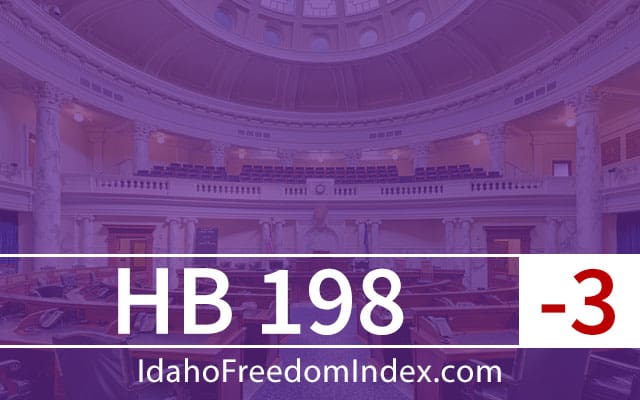


Bill description: HB 198 would allow high school graduates to use advanced opportunities funding to attend a state-designated trade school.
Rating: -3
Does it create, expand, or enlarge any agency, board, program, function, or activity of government? Conversely, does it eliminate or curtail the size or scope of government?
Idaho’s Advanced Opportunities program was established to allow secondary students to take dual credit courses while they attend a public school. Each student is eligible to receive up to $4,125 at any point between grades 7-12. These funds have to be used to take dual-credit examinations such as those offered by the College Board or the International Baccalaureate program. Students may also use the money to take dual credit courses from a college, or to receive a career technical education.
HB 198 would allow individuals to use this funding after they have graduated from high school to defray the costs of tuition at a state-approved trade school. This would include programs that offer “postsecondary education or training for a career or an occupation requiring a license or certification but not an associate’s, a baccalaureate, a master’s, or a doctoral degree.” This would cover programs such as a welding program offered at a community college or a program for mechanics at a vocational school.
This would expand Advanced Opportunities even further than it has already been expanded. In 2015, the program was instituted to provide funding for students who were well ahead of their cohort to take AP, CLEP, or IB examinations or dual-credit courses. The program has been expanded in every year since, and HB 198 would continue that trend.
(-1)
Does it increase government redistribution of wealth? Examples include the use of tax policy or other incentives to reward specific interest groups, businesses, politicians, or government employees with special favors or perks; transfer payments; and hiring additional government employees. Conversely, does it decrease government redistribution of wealth?
Only students who attend public school are eligible to receive Advanced Opportunities funding. Students who are homeschooled or who attend private school for middle school and high school cannot take advantage of these programs.
HB 198 would extend the additional benefits public school students receive even after graduation. Only public school graduates could avail themselves of the $4,125 in funding to attend select career technical programs.
(-1)
Does it increase government spending (for objectionable purposes) or debt? Conversely, does it decrease government spending or debt?
The fiscal note for HB 198 estimates that the total cost to the state would be $1.5 million if students were to take the $4,125 grant after graduation. This assumes that roughly 360 students would avail themselves of the funding, a number which is likely low. It is highly likely that expanding the Advanced Opportunities program to include these post-graduate courses would take substantially more funding.
(-1)


